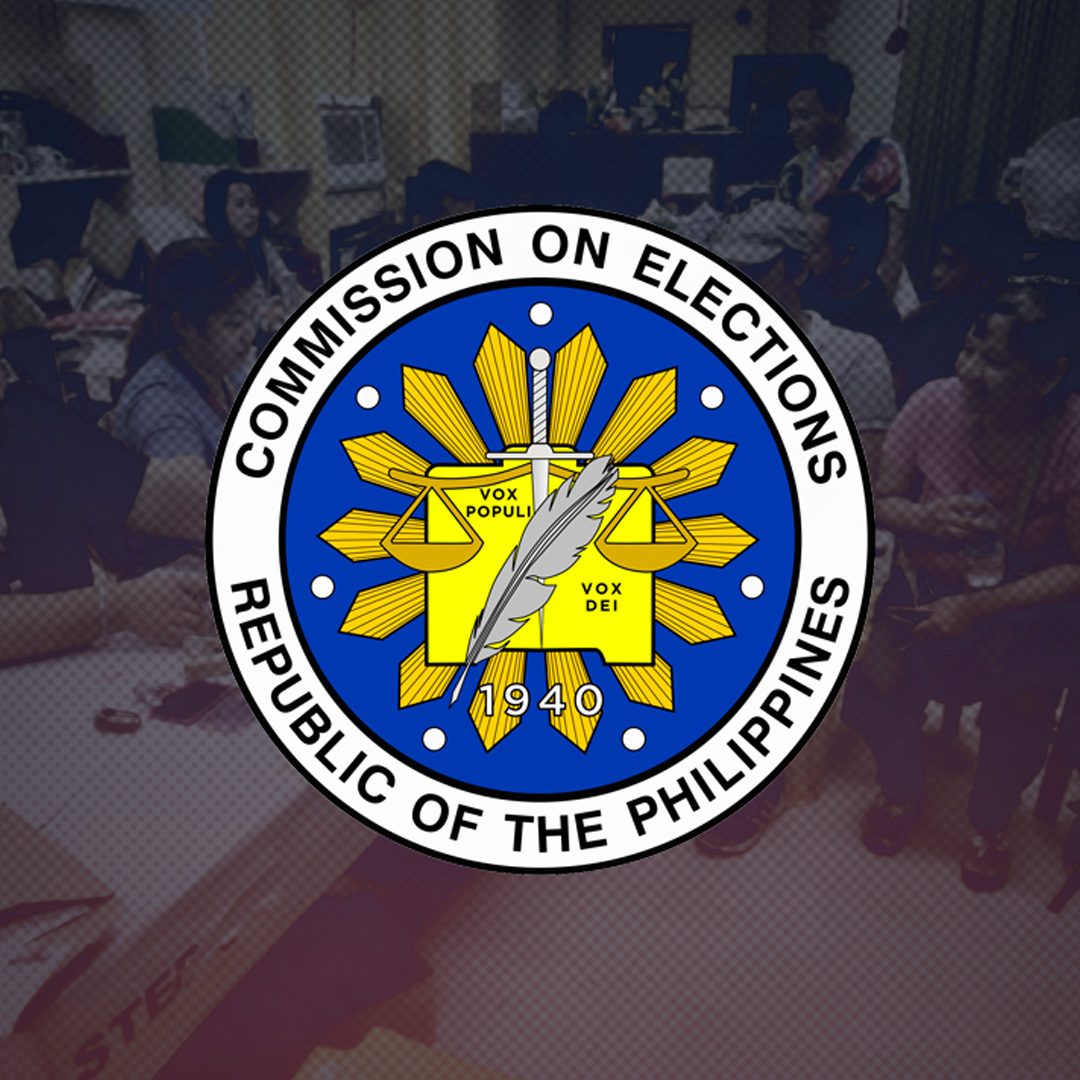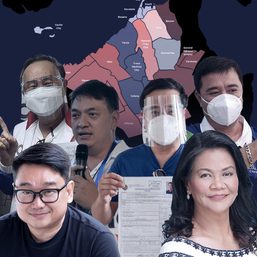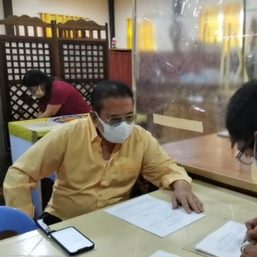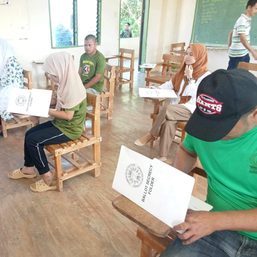SUMMARY
This is AI generated summarization, which may have errors. For context, always refer to the full article.

The Commission on Elections (Comelec) has released the guidelines for the filing of certificates of candidacy (COC) and certificate of nomination and acceptance (CONA) in connection with the May 9, 2022 elections.
Resolution No. 10717, uploaded on the Comelec website on Friday, August 20, contains guidelines that are starkly different from those in past elections. The pandemic has prompted the poll body to issue rigid health protocols to reduce virus risks during the filing of COCs in October.
The filing of COCs for elections before the pandemic was traditionally a spectacle, with supporters of politicians and party-list groups flocking to Comelec offices. That will not happen anymore.
No, it cannot be done online
Aspirants for elective positions will have to file their COCs personally or through an authorized representative from October 1 to 8 (including Saturday and Sunday), from 8 am to 5 pm.
“No COC filed by mail, electronic mail, telegram or facsimile shall be accepted,” the resolution read, quoting Republic Act No. 7166.
The poll body initially considered the possibility of an online filing of COCs, but legal hurdles prevented it from pursuing the idea.
The resolution also made no mention of conducting the filing of COCs in phases, which the poll body previously considered.
Number of supporters allowed will be strictly reduced
Unlike previous filing of COCs where a political aspirant would bring their entire family and supporters, this time, only a maximum of three persons can accompany people who are aspiring to be president, vice president, or senator.
Aspirants for the rest of the elective offices are allowed to bring two people with them.
As for party-list groups, their authorized representative may let one person join them.
“The presence of the respective nominees of the party-list groups shall not be required,” the resolution read.
But what if a certain area is under enhanced community quarantine or modified ECQ? The Comelec said the filing of COCs/CONAs shall be considered an essential activity. Political aspirants or their representatives are considered authorized persons outside residence.
Negative COVID-19 test result is required for certain individuals
Aspirants for the presidency, vice presidency, and the Senate will be compelled to take an RT-PCR or antigen COVID-19 test within 24 hours prior to the filing of COC or CONA. Their test must yield a negative result.
The following people are also mandated to present a negative coronavirus test result on the day of the filing of COCs/CONA:
- Authorized representative of the aspirants
- Chairperson, president, secretary-general, or authorized representative of the political party, sectoral party, organization or coalition for the party-list system
- Comelec personnel in charge of receiving the COCs and CONAs
- Security personnel from the Comelec, the police, and the military
- All members of the media who are covering the event
According to the resolution, the Comelec can shoulder the antigen testing of aspirants who cannot afford a COVID-19 test, as well as Comelec personnel, policemen, and soldiers involved.
There will be ‘COVID-19 marshals’
The Comelec said COVID-19 marshals will be deployed in all receiving offices. Among their tasks are to collect health declaration forms, and call the attention of people who fail to follow health protocols during the filing of COCs.
Compliance with health protocols is a must
The resolution that the Comelec released was very specific about COVID-19 protocols, such as:
- Proper wearing of well-fitting masks (surgical mask, N95, KN95) and face shields at all times
- Proper sanitation of hands, and passing through the foot bath
- Bringing of own pens
- Temperature checks
- Accomplishment of health declaration forms, among others
If an aspirant has a temperature of 37.5°C or above after a repeat temperature screening, they will not be allowed to enter the venue. Their authorized representative may file the COC or CONA instead.
Comelec officials may opt to change venues
Aspirants for elective posts usually file their COCs before Comelec offices. But the poll body has now given local offices the authority to change venues if there are COVID-19 concerns.
“If the designated venue for the filing of COC…is not suitable based on the Inter-Agency Task Force for the Management of Emerging Infectious Diseases (IATF-EID) Guidelines on COVID-19 health and safety protocols, the head of the Receiving Office may request for transfer of venue, not later than September 1, 2021,” Comelec officials said in the resolution.
The new venue must be located in a public building or, if not possible, in a private building that is:
- Not owned, leased, or occupied by an incumbent official, or their relative within the fourth civil degree of consanguinity or affinity
- Not owned by any government officer or leader of a political party, group, or faction
Also, the filing of COCs cannot be conducted in:
- Any building or surrounding premises that are controlled by a private entity, political party, or religious organization
- A location that is inside a military or police camp or reservation, or within a prison compound, or within its perimeters
“The venue must be, as far as practicable, of sufficient size to admit and comfortably accommodate a reasonable number of aspirants at one time. The venue for the filing of COC shall be located within the territory or jurisdiction of the receiving office as centrally as possible, and whenever possible, such location shall be along a public road,” the resolution read.
Heads of the receiving offices must also conduct a physical inspection of the venue at least two weeks before the filing to ensure that safety standards will be adhered to.
The following must also be observed:
- Installation of physical barriers or partitions for when the COCs/CONAs are received
- Frequent sanitation of facilities and equipment
- Designation of a queuing area
- Posting of signs bearing COVID-19 protocols, among others
For national posts, the Comelec said the filing of COCs will be held at one of the tents of Sofitel in Pasay.
Watchers are allowed
The Comelec said independent aspirants, political parties, and accredited citizens’ arms may appoint one watcher to monitor the filing of COCs. They can stay within the premises of the receiving office.
If there are too many of them, preference will be given to the watcher of the accredited citizen’s arm, and the dominant majority and minority parties.
Making the election season safe
The guidelines by the Comelec are the latest set of interventions with which the poll body wants to prove it can conduct safe elections.
Virus risks have already complicated the Comelec’s calendar of activities in the run-up to the 2022 polls. Pending plebiscites were suspended, voter registration was suspended for months, but calls for its extension has been rejected by the poll body due to coronavirus-driven operational hurdles.

The May 9, 2022, vote will be the first nationwide exercise to be conducted against the backdrop of a global health crisis. – Rappler.com
Add a comment
How does this make you feel?






![[EXPLAINER] Should the Comelec prohibit the substitution of candidates?](https://www.rappler.com/tachyon/2021/10/TL-sq.jpg?resize=257%2C257&crop_strategy=attention)








There are no comments yet. Add your comment to start the conversation.